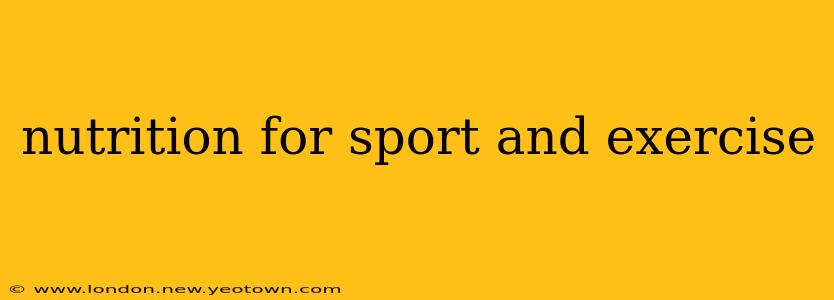The roar of the crowd, the sting of exertion, the sweet taste of victory – these are the hallmarks of athletic achievement. But behind every medal, every personal best, lies a crucial element often overlooked: nutrition. It's not just about eating; it's about fueling your body like a finely tuned machine, optimizing its performance, and aiding in recovery. This isn't a simple equation, though. Understanding nutrition for sport and exercise requires a nuanced approach, tailored to your specific needs and goals.
Let's embark on a journey to unravel the complexities of sports nutrition, addressing some common questions along the way.
What are the essential nutrients for athletes?
This isn't a simple list of vitamins and minerals; it's about understanding the roles these nutrients play in athletic performance. Think of it as building a house: you need strong foundations (macronutrients), sturdy walls (micronutrients), and the right finishing touches (hydration).
Macronutrients – The Building Blocks:
- Carbohydrates: Your primary energy source, particularly during intense exercise. Complex carbs like whole grains, fruits, and vegetables provide sustained energy release, preventing energy crashes.
- Proteins: Essential for muscle growth and repair, crucial for recovery after training. Lean sources like chicken, fish, beans, and lentils are your best bets.
- Fats: Often misunderstood, healthy fats are vital for hormone production, nutrient absorption, and overall health. Include sources like avocados, nuts, seeds, and olive oil.
Micronutrients – The Supporting Cast:
Vitamins and minerals are the unsung heroes, supporting numerous bodily functions, from energy production to immune function. A balanced diet generally provides sufficient amounts, but athletes might benefit from targeted supplementation under the guidance of a registered dietitian or sports nutritionist. Iron, calcium, and vitamin D are particularly important for athletes.
How much protein should athletes consume?
The optimal protein intake for athletes is a hotly debated topic, varying depending on factors such as training intensity, sport type, and individual body composition. While general recommendations exist, consulting a professional is key. A common guideline is to consume 1.2 to 2.0 grams of protein per kilogram of body weight daily for athletes. This number can be higher for endurance athletes or those undergoing intensive strength training. Remember, quality matters; prioritize complete protein sources providing all essential amino acids.
What are the best foods to eat before, during, and after exercise?
This is where personalized nutrition truly shines. The ideal pre-, during, and post-workout meals depend on the intensity and duration of your activity.
Before Exercise:
- Focus: Easily digestible carbohydrates and a moderate amount of protein. Examples: oatmeal with berries, a banana with peanut butter, a whole-wheat bagel with lean turkey.
- Timing: 1-3 hours before exercise, allowing for proper digestion.
During Exercise (for endurance events):
- Focus: Easily digestible carbohydrates to maintain energy levels. Examples: sports gels, energy chews, sports drinks.
- Timing: Every 30-60 minutes during prolonged activity.
After Exercise:
- Focus: Carbohydrates to replenish glycogen stores and protein to aid muscle repair. Examples: a smoothie with protein powder and fruit, a chicken salad sandwich on whole-wheat bread.
- Timing: Within 30-60 minutes post-workout, the ideal window for nutrient uptake.
What is the importance of hydration for athletes?
Hydration is paramount. Dehydration significantly impairs performance, leading to fatigue, decreased endurance, and increased risk of injury. Aim to drink plenty of fluids throughout the day, especially before, during, and after exercise. The exact amount will vary depending on factors such as climate, intensity of exercise, and individual sweat rate. Consider using electrolyte drinks for prolonged exercise to replenish lost salts.
How can I create a personalized nutrition plan for my sport?
Developing a personalized nutrition plan requires understanding your individual needs. This goes beyond generic advice; it necessitates considering your specific sport, training volume, body composition, and any dietary restrictions. Working with a registered dietitian or sports nutritionist is highly recommended. They can conduct a thorough assessment, create a customized plan, and provide ongoing support to help you achieve your athletic goals. They can also help you understand the complexities of supplements and avoid potential pitfalls.
By understanding and applying these principles, athletes can unlock their full potential, fueling their bodies for optimal performance and recovery. Remember, nutrition is not a one-size-fits-all solution; it's a journey of discovery, adaptation, and continuous improvement.

